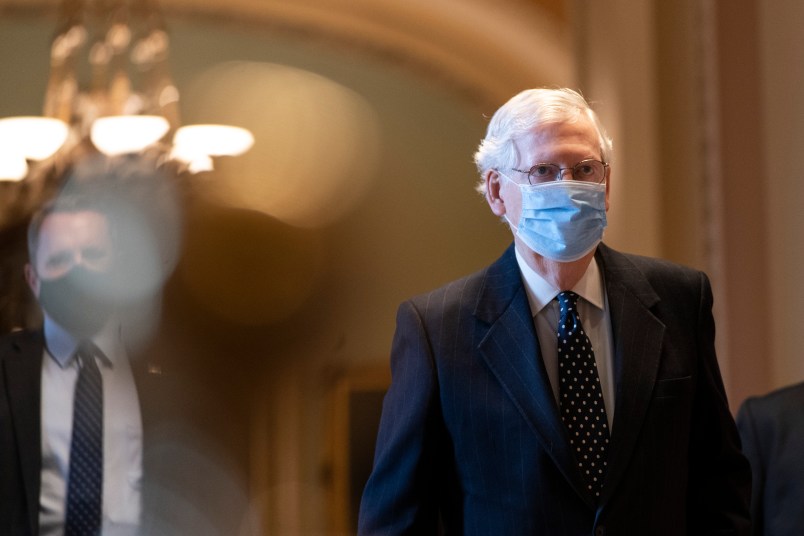Senate Minority Leader Mitch McConnell (R-KY) insisted Monday that Democratic leadership drop its so-far effective strategy to link the bipartisan and reconciliation infrastructure bills, to make it easier for him to extract a win on the former and watch the latter die.
“Republicans have been negotiating in bipartisan good faith to meet the real infrastructure needs of our nation,” he wrote. “The President cannot let congressional Democrats hold a bipartisan bill hostage over a separate and partisan process.”
Ever since the bipartisan group of senators came to an agreement with the White House, Democratic leaders have been carefully marshalling their forces. To soothe progressive Democrats worried that their moderate colleagues would pass the scaled-down bipartisan package, then jump ship when it came time to pass the ambitious and progressive complementary bill through reconciliation, leadership intrinsically linked the two.
“We will not take up a bill in the House until the Senate passes the bipartisan bill and a reconciliation bill,” House Speaker Nancy Pelosi (D-CA) said late last week.
Certain Republicans have since been looking for a way out of the bipartisan deal now that it’s become clear that Democratic leadership won’t let the bipartisan bill pass alone and subject the reconciliation follow-up to death by Democratic infighting. Those Republicans, including McConnell, have settled on faux outrage, claiming that Biden is holding the bipartisan bill hostage by stating that Democrats will pass the bills in tandem even though that’s long been the plan.
“Unless Leader Schumer and Speaker Pelosi walk-back their threats that they will refuse to send the president a bipartisan infrastructure bill unless they also separately pass trillions of dollars for unrelated tax hikes, wasteful spending, and Green New Deal socialism, then President Biden’s walk-back of his veto threat would be a hollow gesture,” McConnell wrote in his Monday statement.
He was referring to President Joe Biden’s weekend press release where he clarified earlier remarks, but made it clear that he is still treating the two bills as connected.
Biden said in the statement that he would not veto the bipartisan bill if it came to his desk without the reconciliation package, but shifted the responsibility for getting the two bills passed to Congress and reemphasized his commitment to signing both.
“To be clear, our bipartisan agreement does not preclude Republicans from attempting to defeat my Families Plan; likewise, they should have no objections to my devoted efforts to pass that Families Plan and other proposals in tandem. We will let the American people—and the Congress—decide,” he wrote.
The statement was reportedly part of Biden’s weekend effort to shore up Republican support for the bill, as some of the GOP negotiators wavered when McConnell guided the caucus into anger that Democrats have so far stood unified on the two pieces of legislation.
Previously, Republicans were candid about their hope that they’d be able to restrict the size and ambition of the proposals in the bipartisan plan — for example, axing tax hikes for corporations and climate provisions — thus deflating support for the reconciliation bill which could reach as high as $6 trillion. If centrist Democrats already had a legislative success on infrastructure under their belts, the thinking went, they’d be less willing to cooperate on the reconciliation package.
By keeping the two bills tied together, Democratic leadership hopes to keep both the moderate and progressive factions of the party united on both bills. That work will continue from afar, as the Senate is in recess for the next couple weeks.



